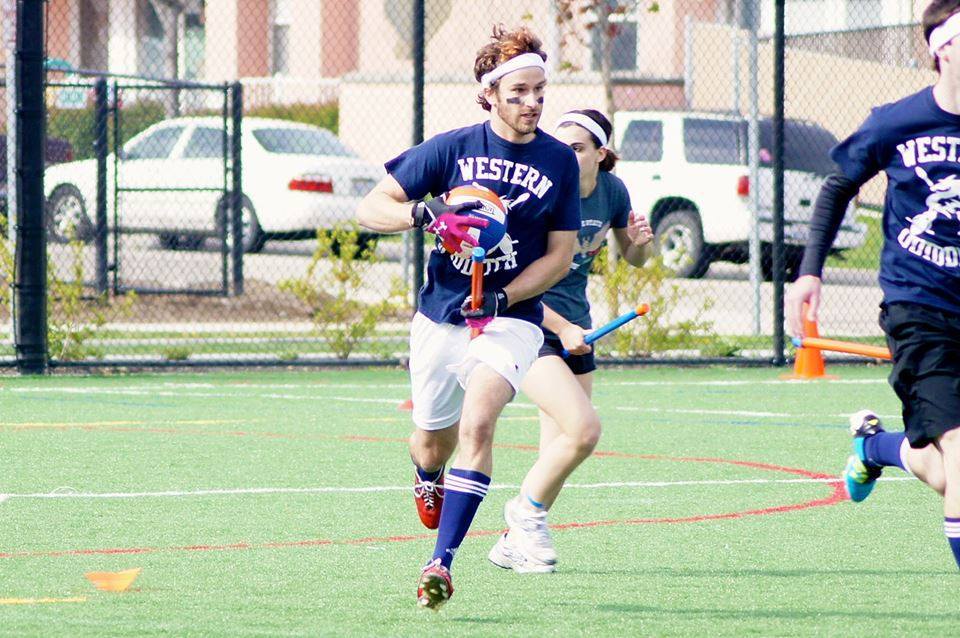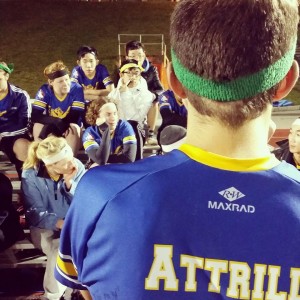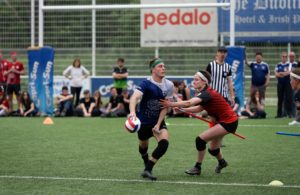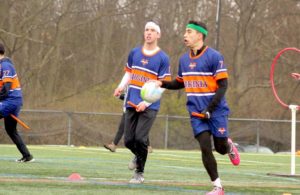- Rule, Britannia, no more?
- Unpopular Opinions: US Quadball Cup 2023
- Proven Contenders: University of Virginia
- Proven Contenders: Rutgers University
- Proven Contenders: University of Michigan
- Proven Contenders: Creighton University
- Different Perspectives: A Look Inside USA Ultimate
- Antwerp QC, Much of Belgian Core, Leaves Competitive Quidditch
Submission: Northwest Aspires to Attain More Than Just Bids
There’s about to be a shootout at the kids’ table…
And we all plan to go till the very end.
This coming weekend, the Northwest will converge for the third time this year. This time however, all the chips are on the table. All seven of the region’s teams aren’t just playing for fun, championship medals or even World Cup bids. No, this is something much different. Our regional has a prize all seven teams can leave with, but it will be quite possibly the greatest challenge any of them have faced.
This weekend we play for respect.
Saturday in Tukwila, Washington, the Northwest will see its first regional championship since the region’s inception less than a year ago. In that time, the Northwest has become a tale of two tiers. At the top are the “Big Three”: the Western Washington University Wyverns, the University of British Columbia Thunderbirds and the Boise State University Abraxans. The second tier consists of the University of Idaho Manticores, the British Columbia Quidditch Club, the Boise State Thestrals and the Portland Augureys. Each team has a story to tell and each has a reason why a dynamic regional showing could change things for the better.
The lower tier itself is a story of spirit and passion. All four teams are contesting with lower roster numbers and season-long retention issues, but all four have also soldiered on with a tenaciousness that has kept them alive.
Portland Augureys
First on the docket are the Augureys. Starting the year with the USQ’s equipment grant, the only community team in the Pacific Northwest boasts the smallest roster of the region. But riding on the presence of hybrid threat Benji B’Shalom, chaser Jeff Chatterton and the team’s exceptional manager Tasha Robertson, the Augureys have not lost steam developing their defensive strategy, despite having struggled to put a competitive game on their record.
Perhaps the most telling aspect of the Augureys’ game is the seeking B’Shalom has pulled off against the Wyverns and the Abraxans. In both matches, B’Shalom pulled snitch catches against his opponents’ more seasoned seekers. With some true heart and utter bravery, the team could see success against the Thestrals and even some athletic grabs against any of the top three teams, but largely the Augureys’ very attendance at the Northwest Regional marks an important opportunity for legitimization in their Portland community.
University of Idaho Manticores
The Moscow Manticores are starting to find some traction in their cohesiveness, and that could make for stronger challenges against second-tier teams. Held together by the keeping of Cody Fairchild and the developing beating of players such as Ariana Gaskin, the Manticores possess the same struggle many teams at football-focused schools initially face: difficulty retaining depth and experience. If Idaho’s dynamic and passionate leadership can see through this year, the team can build off of the learning experience their regional will offer it. With a decent showing this weekend, the Manticores could gain the respect from their school that they deserve.
British Columbia Quidditch Club
British Columbia QC is at the top of the Northwest’s B-teams. With much stronger records and recent showings than the Augureys or the Manticores, this team might just be seeing progress in its upward climb. While the squad’s play style might differ from the University of British Columbia, its parent team, many similarities are still present.
At February’s Komrade Cup, the squad ran a rough but passable version of a 1.5 beater offense that could see potential with some practice. But it is development that is British Columbia QC’s greatest weakness. Many players have demonstrated a lack of understanding of the fundamentals and even the sport’s most basic rules, evidenced by play at both Komrade Cup and Clash in the Cascades.
If the team’s early promise can be built upon, it will be through continuous experience and acceptance of its autonomy. Fair predictions could give British Columbia QC wins over the other second-tier squads before it bows out to a top-tier team in a well-fought loss. The fight in Tukwila could give this B-team the chance to show its the entire British Columbia program that it means business.
Boise State University Thestrals
The Thestrals are the other B-team in this region, hailing from Boise State and falling under the tutelage of captain Harrison Baucom. There is little to say about the team at the moment, as the Thestrals’ only real play time has been on a strong loss against Utah State University and in competitive games against the Manticores and the Augureys. Riding the guidance of the Abraxans’ brilliant leadership, the Thestrals could see great games against any bottom-tier squad before falling to one of the Big Three. This Saturday could offer the team more or less what British Columbia QC is after: an opportunity to step out of the shadow of its parent squad.
On the other side of the coin are the three giants that occupy the region. At each turn, these more established programs are looking to lend legitimacy to their uphill, World Cup-qualifying battle. While the potential for a championship win excites the players, the biggest gift will be the value this regional could lend to fortifying those frequently discounted words: “Yes my team plays a real sport.”
Western Washington University Wyverns
The Wyverns are fresh off of a first-place finish and a first-place tie in the last two Northwest tournaments. Thanks to the defensive IQs of coach Nicole Jackson and assistant coach Drew Sutorious, Western Washington’s gameplay utilizes players tactically without the same physical intention other teams have, posing a threat against the hit-first styles of the British Columbia Thunderbirds and Boise State.
The biggest weapon in the Wyverns’ arsenal is hard to pinpoint. It could be the “I can’t believe they are that good” scoring threats of Robert Stolzberg, Jacob Keith or Drew Sutorius or the two-headed giant that is Ross Schram von Haupt and Jake Ronhaar. Maybe it is the nearly inexhaustible chaser corps that erase any doubt about the team’s depth or the almost comical wingspan of former track athlete and seeker Sam Seid. Some say it is the beating of Molly Bocian, Sarah Bollard and an elite group of freshman male beaters. Regardless of when the biggest weapon is, each of these things will be key to attaining a title. If the Wyverns keep their heads and utilize their collective quidditch IQ, they could walk away with a bid and a trophy.
University of British Columbia Thunderbirds
The Thunderbirds created the only blemish on Western Washington’s perfect record, and that game was the product of a heated rivalry now rooted in deep respect. Holding a first-place win at the Clash in the Cascades, this top-notch Canadian squad is built on a hard-hitting and energetic offense. Boasting heavy hitters Cameron Cutler and Lendl Magispoc, along with the shifty beating of players such as Erica Milley, UBC should take home an easy bid.
By inducing the veritable pressure cooker of offensive beating and ballcarrier tackling that has brought them success through their time on the major circuit, the Thunderbirds could walk away this weekend the Northwest Regional champions. Their only weakness now might be an early match against the increasingly strong Boise State Abraxans.
Boise State University Abraxans
The Boise State Abraxans are coming off of a return to form at Komrade Cup after a rough start to the season. The team’s chaser corps is a mordor of heavy hitters, including Casey Thompson, Bryan Bixler, Amy Marie and Joshua Governer, among others, and is supplemented by the hybrid play of Stew Driflot.
Bixler, a former football player, is able to lay clean and powerful tackles that might make him the closest thing to a “beastmode” the team has. What the Abraxans may have lacked in the beginning of the year they seem to be ready to deliver. Their potent use of the 1.5 bludger strategy has peaked in recent months. Similar in style to the Thunderbirds’ use of 1.5, Boise State is able to keep its vertical beater stack ready for offense or defense on a moment’s notice.
The team’s excellent leadership is helmed by, quite possibly, the most dynamic leader and one of the most gifted minds in quidditch, Kym Couch. If Boise State is to take home everything, it will do it by staying on top of the game and keeping opponents focused on a frantic quaffle game before Driflot makes a grab with his dramatic athleticism.
In the end, when the passes stop flying, the final tail is removed and the bruises start to heal, we might hold onto our wins, but getting to take our seat at this competition is what we’ll all cherish. All seven teams are ready to prove the heart, passion and talent this region has.
Get ready. The Northwest is coming.





